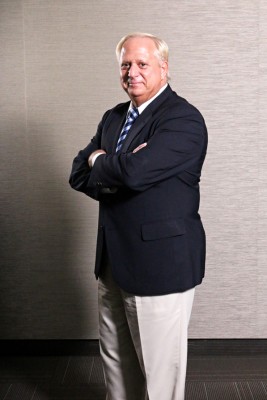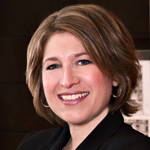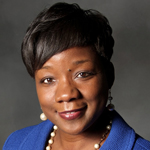
Lee Allen can remember back to the sixth grade and seeing cancer as an intriguing big black box, a puzzle that he wanted to help solve. Since then, he has attacked that challenge from every angle. He explored the sciences, building a strong base of knowledge by earning a PhD in oncology and studying cancer-signaling pathways. He got his MD so that he could work with patients as a physician. As a hematology and oncology fellow, he honed his investigational and analytical skills focused on signal transduction pathways in the laboratory of a Nobel Laureate at Duke University.
“Cancer is a complicated problem, and trying to understand the scientific complexities and the human impact has helped shape my role as CMO,” Allen says. As a physician, Allen was deeply impacted by the patients he treated, as well as their families. He grew close with them, experiencing the sorrow of their disease and the joy of remission.
For Allen, the experience underscored the limitations of current treatments. As a result, he says, “I try to do my work with a great sense of urgency, knowing that patients’ lives are dependent upon it, and that delays in getting a new drug approved have a dire toll.” He personally finds the phrase “the patient is waiting” very inspirational and uses it to motivate and drive his development teams to exceed expectations.
“There are many exciting things that you learn through science, but what’s rewarding is translating them into new treatments for patients,” says Allen, who transitioned from being an academic physician to developing pharmaceuticals because it was the perfect opportunity to combine his love of scientific analysis with his passion for people. By developing drugs to address the needs of cancer patients, he could help provide them with new hope and impact thousands of lives. Given the low clinical-development success rates of drugs, Allen feels fortunate to have had a leadership role in successfully getting global approvals for several new drugs impacting the lives of cancer patients.
Unfortunately, cancer is challenging: it is not a single disease at all but hundreds of different diseases each with distinct features. No two tumors are the same; they have different causal factors, genetic alterations, and aberrant signaling pathways. Cancer arises when cells grow in an uncontrolled way, breaking away from normal growth control mechanisms; then they develop the ability to invade and spread. Cancer is smart; it adapts to grow despite the medicines made to control it, becoming resistant to treatment. Allen believes more options need to be made available to treat these varying drivers. “Drug development isn’t a nine-to-five job,” he says. “We’re on call twenty-four hours a day, driving development and demonstrating the safety and effectiveness of drugs to quickly get global regulatory approvals.”
Spectrum has five drugs currently being marketed—Fusilev, Folotyn, Zevalin, Marqibo, and most recently, Beleodaq—which treat non-Hodgkin’s lymphoma, leukemia, and colorectal cancers. Spectrum plans to submit one new drug application per year to the FDA over the next five years. But with just 8 percent of cancer drugs making it to approval, the war against cancer is far from over. “When we started talking about the war on cancer four decades ago, we naively hoped that we would have conquered it by now,” Allen says. “Yes, we have made progress, but it’s clear there will be no magic bullet. We’re always going after new targets and trying to figure out how to better kill cancer cells in a way that limits toxicity to other normal cells.”
While developing new drugs is a part of Allen’s role as chief medical officer, his job description is much more extensive. As a corporate officer, he has broad strategic leadership roles, including helping to prioritize the company’s portfolio, providing oversight for drug safety, supporting the marketing group with medical information, evaluating new business development opportunities, engaging key clinical leaders, and being the scientific and medical voice for the organization.
To be successful, Allen focuses on three key factors: people—attracting, hiring, and retaining quality talent and developing researchers who have passion for their work; portfolio—the organization continually needs to prioritize opportunities that have the greatest impact on patients, value, and probability of success; and finally, process—building a solid infrastructure that ensures quality, efficiency, and compliance. Allen joined Spectrum because of the strong foundation the company already had in oncology, the promise of its portfolio, and his alignment with its core mission of bringing new drugs to cancer patients.
“When we started talking about the war on cancer four decades ago, we naively hoped that we would have conquered it by now. Yes, we have made progress, but it’s clear there will be no magic bullet.”
Allen places emphasis on continually motivating colleagues, developing their talents through teamwork. “I like to lead by example,” he says. “When there’s a deadline for the team, I’m in there, working late and coming in early.” For Allen, it’s critical that his colleagues know the impact of their roles on the company’s deliverables; he also uses various approaches to highlight the impact their work has on patients and how they are helping provide new treatment options and hope. With his growing team of dedicated professionals, Allen is excited and confident about Spectrum’s future.
Over the coming years, Allen has lofty goals for his organization. He wants to continue to aggressively expand the pipeline of products by getting new drugs approved by the FDA and ex-US regulators. But most importantly, he wants to use his skills and expertise on performing his tasks as chief medical officer, from drug development to business strategy, to help give cancer patients as many options for treating their disease, and as much hope, as possible. He doesn’t want to keep any patients waiting.
Each day your therapy sits in the development pipeline costs you money and patients the opportunity for treatment. At Cardinal Health Regulatory Sciences, we take a “right the first time” approach to product development and work to de-risk each step of the development continuum. We strategically navigate regulatory pathways, focusing on the regulatory science that drives product approval. As your trusted partner on this journey, Cardinal Health Regulatory Sciences will consult closely with you to ensure that together, we meet your business objectives and bring new therapies to the patients who need them.

